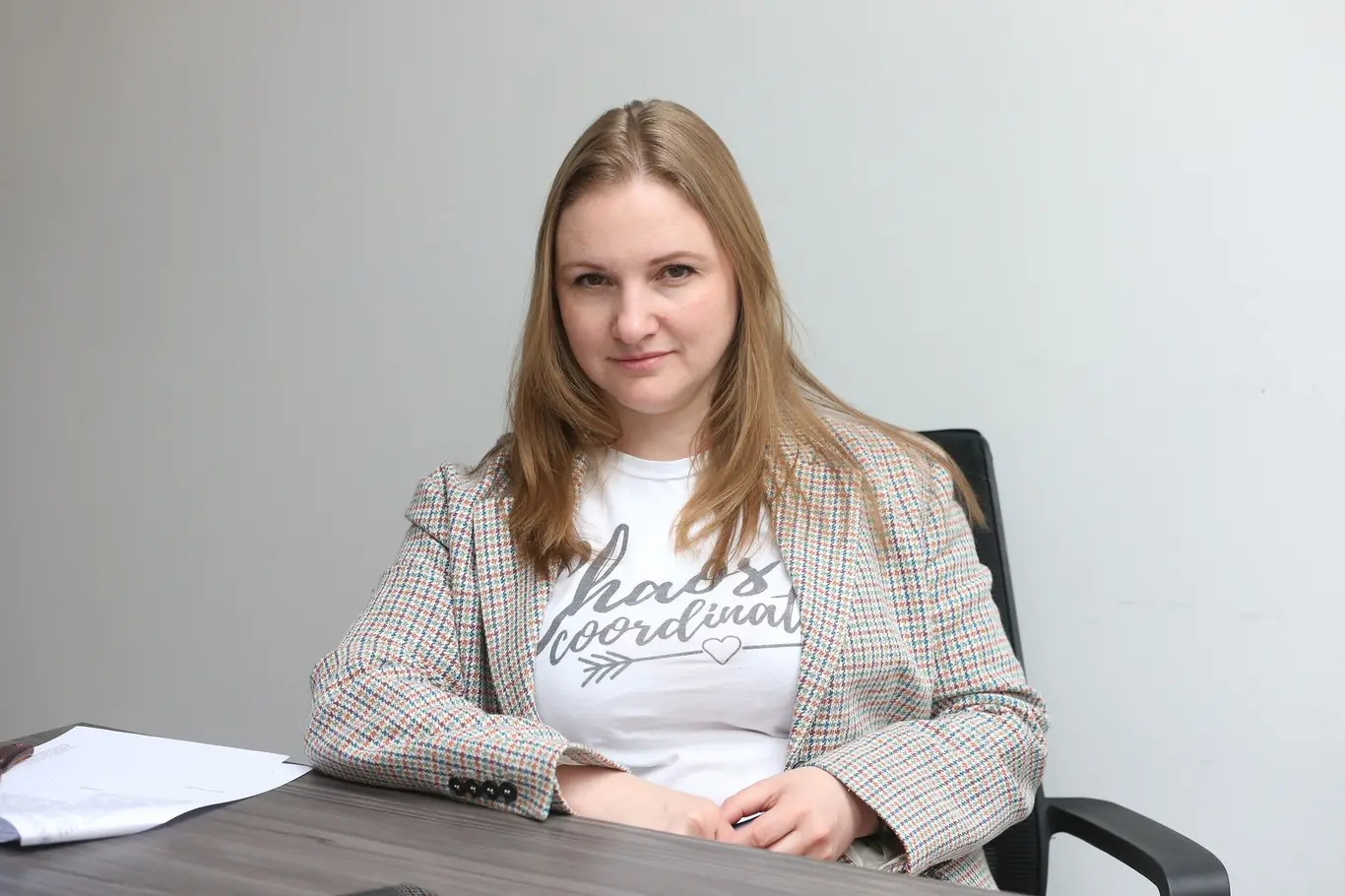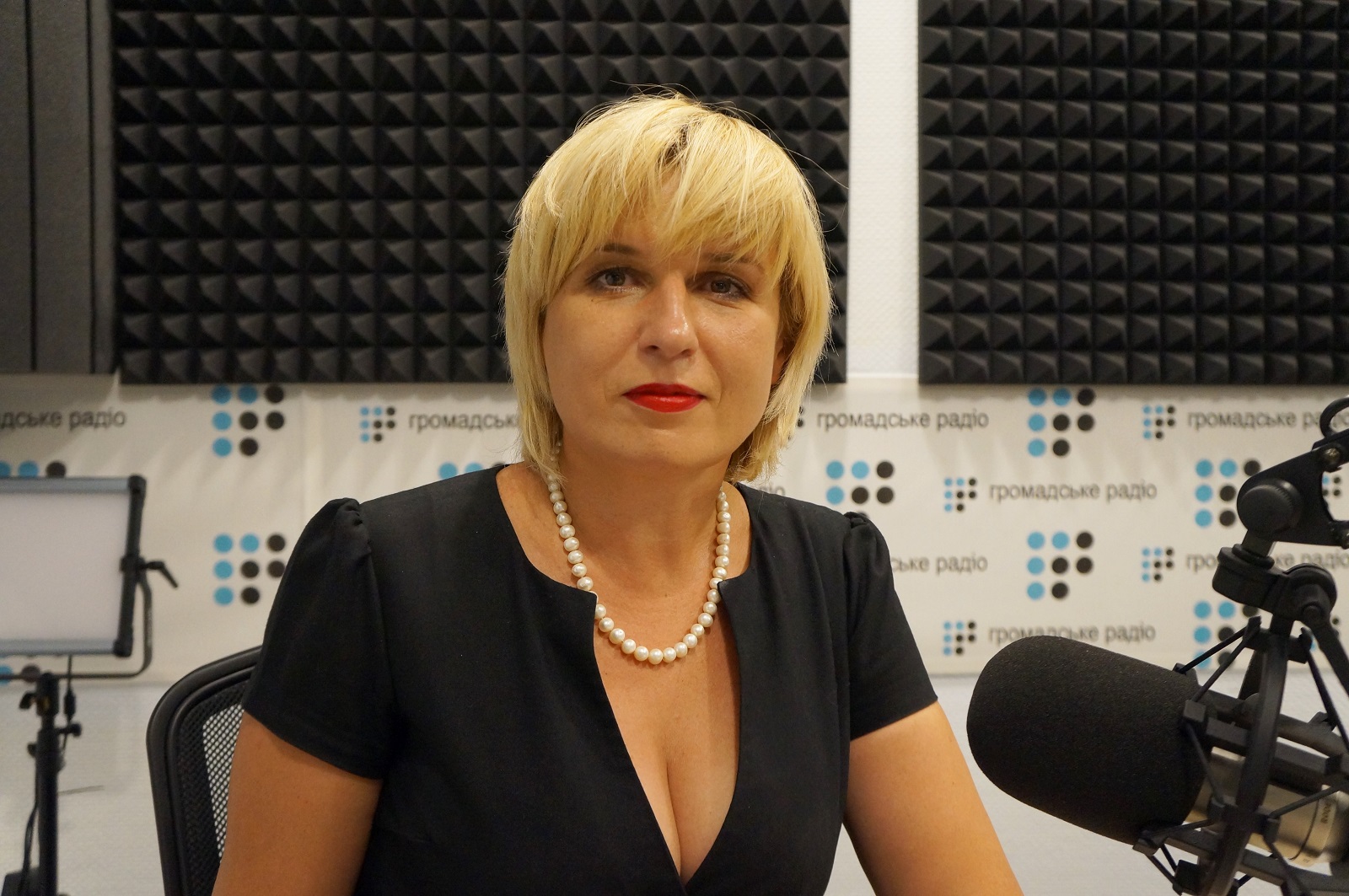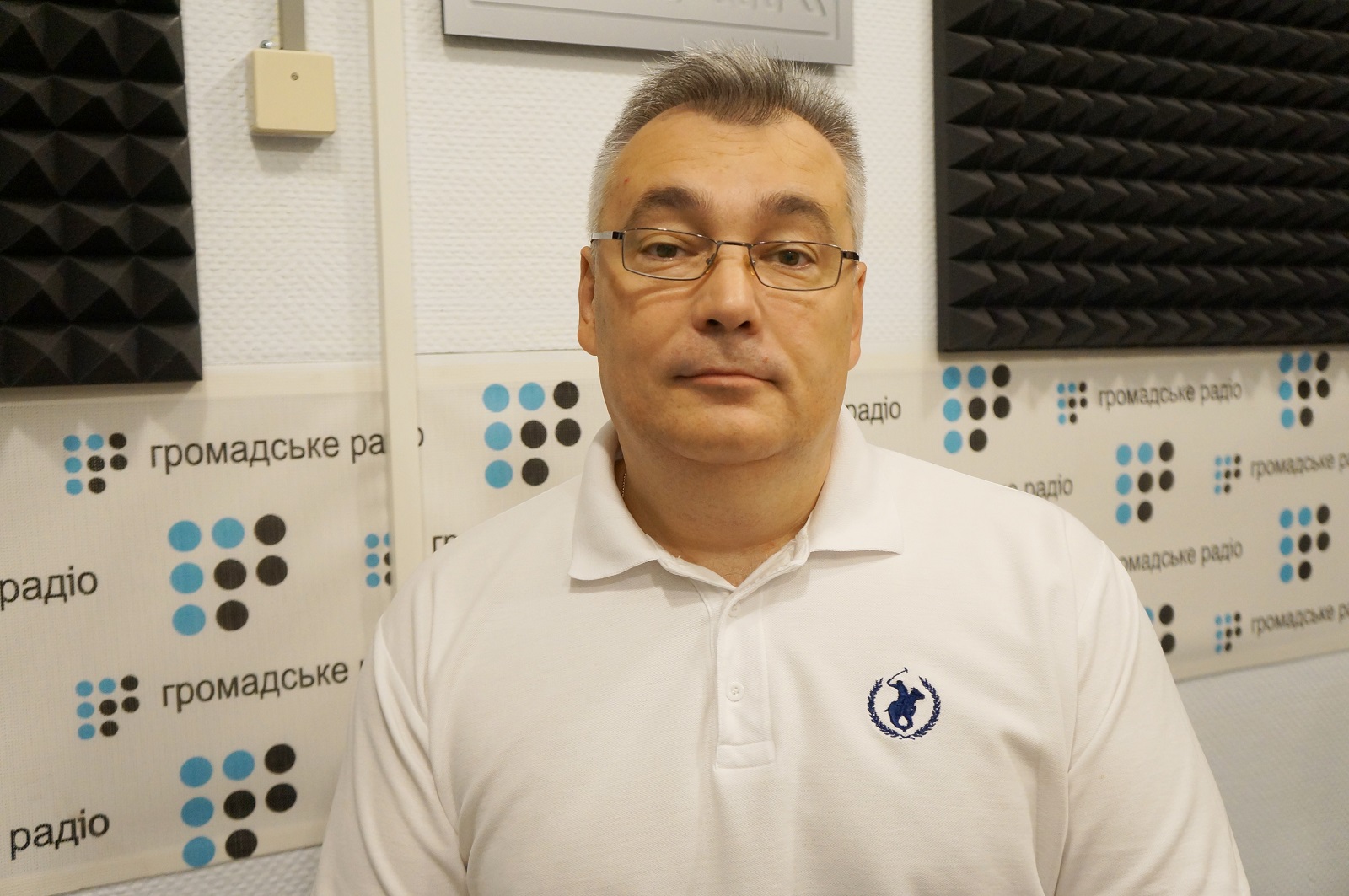
Как общаться с людьми, которые не выехали из оккупированных территорий?
Talking to people and relatives who for various reasons stayed behind in the territory which Ukraine does not control. Full show transcript. The audio is in Ukrainian or Russian


Anna Mayboroda, a volunteer of «The PromoTrain», and co-coordinator of «Prava Sprava» (The Right Cause) public organization, Dmytro Snehiryov, are in our studio, and psychologist Marta Pyvovarenko will comment on such a complicated issue and give her advice via skype.
Oleksiy Burlakov: How important it is to talk to people who live on the occupied and non-controlled territories?
Marta Pyvovarenko: People who are living now on those territories are in a frozen state; they do not understand to the full what is happening. This is why for them communicating with other people is a necessary and important component for making clear the complicated situation that they have found themselves in.
Many people who had thought that the future of their children is rather blurred in those territories have already left.
Oleksiy Burlakov: However, many people cannot leave this territory because of different reasons. What is the way to talk to them?
Marta Pyvovarenko: In any case, communication is important for them, it is a bridge to reality. Contact should be maintained at least over the phone.
Anna Mayboroda: I would break the people who stayed in non-controlled territories down into two categories: those who live there because of their ideas, and those who really cannot leave: sick people, pensioners, and those who really have nowhere to relocate. For this is true, regrettably, that a clear-cut program of our state in relation to resettlers had not emerged within two years. People are not sure if they are expected here and met with love.

Dmytro Tuzov: When you come to Donbas do you feel that they want to talk to you> Do you feel people’s need for psychological help?
Anna Mayboroda: Yes, and MArta was right in saying that there’s a need to talk to people. In which format? A specific approach should be chosen for every person. When we went with «The PromoTrain» to Bakhmutka, Zaytseve and other populated centers I set myself a task to talk to people about the topics that unite us: to tell about similar problems; to explain that I am the same as they are; that I am, too, preoccupied, in the first turn, with life, health, stability, children’s future.
And, talking to those people, I tried not to touch upon painful topics in order not to arrange the flight analysis on who’s guilty.
In Zaytseve, I had at once designated my stance and said: «Guys, let’s talk about what we must do so that you feel good.»
Another case from my experience: we went with volunteers to the frontline to do some Xmas caroling. While moving along the frontline territory, in Opytne, we saw civilians walking the streets. Just imagine how surprized they were when they saw festively clad people leaving a car and starting to sing for them and handing out presents. The people were overjoyed. Within five minutes, people started to pour out of their houses destroyed by bombs, locals surrounded me, and we sang carols together.
Dmytro Tuzov: What are the difficulties in talking to people next to the frontline, and how they should be solved?
Marta Pyvovarenko: This is very right: to draw people’s attentiopn to the fundamental values in life, to wake them up from the prolonged difficult situation, from those horrors that they are observing every day. And it is very important to show that we have common values, and though the Ukrainian mentality does differ from the Russian mentality, this does not mean that this is bad. This is just another approach and another upbringing, and it is not obligatory to look for pretexts to aggravate the situation.
Oleksiy Burlakov: How can the topics potentially causing flare-up points be avoided?
Marta Pyvovarenko: You should remember in this context why the issue of paying pensions in non-controlled territories is still topical. If a person is left without money and cannot satisfy their basic needs, they become wild and are capable of something terrible. If the fight for survival is not topical, they begin to ponder the future. If we want to see their best in people, we have to provide for theiur basic needs.
Anna Mayboroda: As for the pensions, I want to say the following: a decision should be adopted on state level, and we should have a clear-cut state policy.
We all should wish to live in Ukraine. including people who are in the non-controlled territory. And the state should apply a lot of effort to this, starting from stability, order, etc. However, it is wrong to play on intention to pay pensions to everyone, and we will be loved for this.
Dmytro Tuzov: How to balance this policy? On the one hand, our citizens remained in those territories, and we should do everything for them to understand that Ukraine has not forgotten them, On the other hand, though, there are some citizens who hate Ukraine and will pocket Ukrainian money saying, «Ukrainians are fools: we wage a war against them, and they send us money».
How to show that Ukraine is fighting and even in such a hardest state continues helping its citizens under occupation?
Anna Mayboroda: We should knock on this territory informationwise and bring along a clear-cut position of our country of us having a strategy.
Second is the targeted delivery of aid, as much as possible.
Of course, there is no clear recipe as of now. I do sincerely hope that a solution will be finally found but those deaths and sufferings of our people cannot be forgotten, and we should not try to endear ourselves to the rest in order to bring back the heads of those who rejoice at our failures. This is a wrong way. .
We will offer to your attention a piece on communicating within a family circle of relatives who have differemt opinions about the current conflict.
[Package: How to preserve ties with relatives in non-controlled territories?]
Olha Polyakova has relatives in the part of Luhansk Region not controlled by Ukraine. Because their political views differ, their relations became tense, and with some they have stopped. Olha came to Kharkiv with her family in the time of the the beginning of the military conflict in Donbas. Olha’s parents, as well as her husband’s, stayed in Stakhanov, now Kadiyivka, as well as some other relatives. It is easy for the woman to talk to her parents. Their political views coincide. With others, the topics of war and politics have to be avoided, the resettler says. Olha does not want to be photographed, concerned with her safety. She also asked to change her surname, .
«With other relatives, I have those who do not support me, we try to avoid this topic. At least I, as soon as we start to talk about war, or something else, I find a topic. Because it is difficult and there’s no desire to enter conflict. Is there something to eat? How often they shoot? I do not specify who is shooting as the answer there will be one. How they live? Do they get ill or don’t? Such questions,» resettler Olha Polyakova shares her experience.
A crisis psychologist, Olena Hryhoryeva, advises not to sever comtacts with relatives bur to talk on neutral topics. If relatives touch upon a topic which is unpleasant for you, say that you are not prepared to discuss it. You should treat with sympathy those who cannot leave the non-controlled territories or those who are placed along the demarrkation line, says Olena Hryhoryeva.
«It is important to talkto your relatives even if they have other views. However, you should try not to talk about politics. So that they have such a feeling, a sense that it is you who are a normal, human being. Even if you have views that are different from theirs. So that in spite of differing views this does not kill your human relations,» the crisis psychologist Olena Hryhoryeva says.
Olha’s husband had not managed to keep warm relations with his relatives. Because of difference in views, he stopped to talk to his sister and friends altogether, resettler Olha Polyakova says.
«For some reason, for me it is easier to talk. He adheres to more extreme views. He became adversaries with his friends with whom they were friends since their early years. They also went to a pioneer camp together, they were very close. After his friend began to support Russia, I have been persuading my brother to phone and talk to him but I cannot achieve this so far. War interfered with them.»
Olha’s 13-year-old daughter also does not talk to her former classmates and friends. The war conflict caused differences even between children, resettler Olha Polyakova recalls:
«There are practically no friends left there. Because those who were there, they support the militia. She is categorically against this, so she became a ‘Banderite’ for them and there’s no communication.»
Olha Polyakova also broke her friendly relations with many people who support the so-called LNR. Their communication has dwindled to zero.
«I tried to talk to them but when I herd talk that Ukrainians are coming to us, we are being bombed and how long this will last, this was very unpleasant. This is why this was my last phone call. Of course, I had not spoken out and had not expressed my opinion. However, our communication stopped,» Olha Polyakova says.
If you feel that a person who are in the non-controlled territory are not ready to regard a different point of view do not try to persuade them, the crisis psychologist, Olena Hryhoryeva advises:
«As a rule, forced persuasion leads to people beginning to even more forcefully defending their views. Even if people went to the referedum it is not worth judging them very severely.Because they just had not known what this would lead to. And it is not worth blaming them additionally. Soonest of all, they had already repented a thousand times. What is needed is not reminding all the time all the worst that a person did but looking forward and thinking about what we can do together in order to live together in some normal way in the future,» the crisis psychologist, Olena Hryhoryeva, thinks.
Both resettler Olha Polyakova and psychologist Olena Hryhoryva are convinced that relations between relatives and friends on both sides of the demarkation line will improve when there’s access to Ukrainan media in the non-controlled territories. In their opinion, this will allow people who live there to see what is happening in Ukraine from another side.
Oleksiy Burlakov: What to do if people in a family adhere to different positions: some, to pro-Russian, others, to pro-Ukrainian? Is it right to avoid hot topics and is it possible? And is it right to stop talking because of political convictions?
Marta Pyvovarenko: I am in Lviv now, and when I began to work with resettlers I faced a problem when resettlers here were perceived as people with with a different mentality. But you should separate separatism from mentality as mentality is not a matter of choice. If a person lives in Donbas, they communicate in an original way, jokes differently, some terms characteristic for only this region chance in their speech this does not mean that they are bad.
Anna Mayboroda: What methodology will be correct in communicating? What our position should be?
Marta Pyvovarenko: If a person wants to set up relations, they would not seek a pretext for entering a conflict and convince someone of something; they would not necessarily speak Ukrainian even if they are from Lviv; they will ask many questions, provoke their interlocutors to think, switch on their logic.

Dmytro Snehyryov: I am from Luhansk, and I don’t understand when they say that there is a mentality of its own in Donbas, and jokes, or some world outlook which differs from all-Ukrainian outlook. I do not understand what is a water-breaking point between residents of Donbas and Lviv, this is a discovery for me. My family, for instance, had left entirely, up to the seventh generation, both on my side, and on my wife’s.
Dmytro Tuzov: Perhaps you reacted in such a painful way because your stance is pro-Ukrainian?
Dmytro Snehyryov: Absolutely no, not because of this. But the psychologist, for some reason, talks about the stereotype of a Donbas resident who cracks and spits out sunflower seeds and talk exclusively criminal slang. this is bothersome.
For 24 years, we have been trying to hear the Russian-speaking Donbas but over these 24 years the Russian-speaking Donbas had not heard the Ukrainian-speaking Donbas. And now they again try to sit us around a negotiating table and make share the views of the Russian-speaking Donbas which has risen against us. What’s the purpose of doing this? They had made their choice.
Also, you shoud not forget that two years of occupation elapsed; they were brainwashed anyway, and this process became stronger over these two years. Nobody will meet us with bread and salt there, let us take off the rose-glass spectacles.
Anna Mayboroda: How not to touch upon the most painful aspects in families, not to raise political issues but love each other and build communication upon other topics? Or nonetheless cardinally drift away from each other because of political views? What is the right way? I woud like an answer for this question from a psychologist.
I think these sharp issues should be avoided, really. You cannot refute your mother who lives on the other side because she is your mother, whatever she may be, she gave birth to you. and there should be an element of care and protection. It is not worth raising these issues of politics with her if her stance is different.
Marta Pyvovarenko: Regrettably, it is not possible to avoid sharp issues altogether. Naturally, people talk on these topics, listening to each other but not hearing each other.
Oleksiy Burlakov: What to do if a conversation has already started and begins to heat up?
Marta Pyvovarenko: When you try to prove something you don’t move forward on this issue, so take a step back, change the topic. It would be more correct to ask why this issue is being raised as this is just a pretext to raise a scandal in the family. Usually, something else hides behind aggression.
Dmytro Tuzov: Have you had attempts to talk to those who supported what had happened?
Dmytro Snehyryov: Yes of course, we have been talkning for the entire two years, there’s an ongoing communication.
I don’t know why sit at one table those who support anti-Ukrainian and Ukrainian positions.
Dmytro Tuzov: Because these people live in one family?
Dmytro Snehyryov: This is not a family anymore, this is a broken mug. This is already a juxtaposition of those memories that are impossible to erase or forget anymore. It is the presence of memories that defines people’s behavior.
Oleksiy Burlakov: And what if those are the parents?
Dmytro Snehyryov: We had already gone through such wars when families faced choices. And if family members found themselves on different sides of the barricades this had never ended in reconciliation.
Anna Mayboroda: Still, we should be wise in relation to our near ones and to relatives. Yes, the period of cooling down has come but this is the time to re-evaluate the situation. It is wrong to impose your own solution.
Marta Pyvovarenko: When we conducted a survey we worked with a great number of families, so we can talk about statistics. We realized that arguments only lead to aggravation of the situation.
При поддержке

Цей матеріал було створено за підтримки International Medical Corps та JSI Research & Training Institute, INC, завдяки грантовій підтримці USAID. Погляди та думки, висловлені в цьому матеріалі, не повинні жодним чином розглядатися як відображення поглядів чи думок всіх згаданих організацій.
This material has been produced with the generous support of the International Medical Corps and JSI Research & Training Institute, INC. through a grant by United States Agency for International Development. The views and opinions expressed herein shall not, in any way whatsoever, be construed to reflect the views or opinions of all the mentioned organizations.



